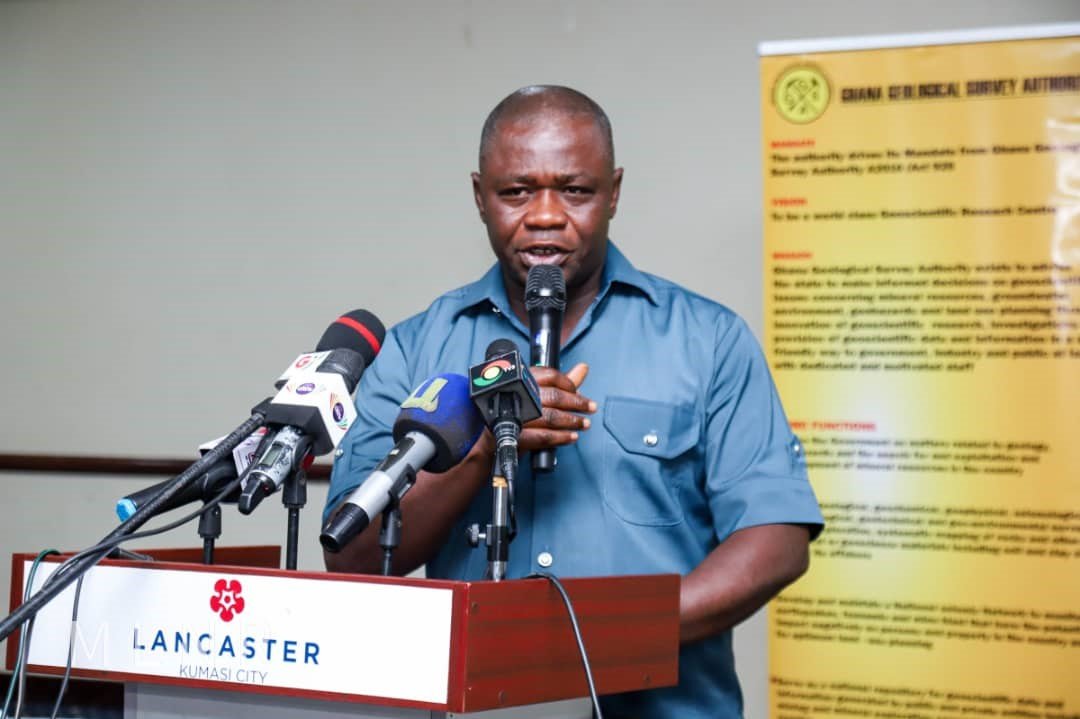
Isaac Mwinbelle, GGSA Director-General

The Ghana Geological Survey Authority (GGSA) has responded to media reports of a suspected earth tremor activity at Twifo-Mampong in the Central Region of Ghana on June 30, 2023.
A statement released by the Director General of GGSA, Isaac Mwinbelle, said the monitoring records from Authority’s network of seismic stations located across the country did not record any major earth tremor event from the stations on the said date. However, he explained that minor earth disturbances recorded during the period did not have the potential to cause the impact that was recorded.
Mr Mwinbelle in the statement noted that an investigation by a team of seismologists and geoscientists from the GGSA, together with the District Chief Executive (DCE) for the area, Robert Agyemang Nyantakyi, Assembly Members and Officials from NADMO on Tuesday July 11, 2023 revealed that the event was a landslide which occurred after a heavy downpour the previous day, June 29, 2023.
“Residents in the area confirmed that no ground shaking was felt by anyone in the town. The landslide event took place on a steep hill within farmlands which are primarily used for cocoa plantations. As a result, several cocoa trees were destroyed,” the statement added.
Geological materials
The statement explained that the geological materials observed at the site were highly weathered meta-sediments, which were saturated from the heavy downpour, resulting in the movement of materials in multiple locations along the slopes of the hill.
It added that the area where the landslide occurred was far away from settlements and, thus, did not affect lives and property. However, the GGSA stressed that the event should serve as a caution for potential development along the slopes of the hill to be avoided and the need for proper enforcement of land-use planning.
It further advised the public to stop development along slopes of hills, as such areas may not be stable for infrastructural development. Additionally, it admonished Metropolitan and Municipal District Assemblies (MMDAs) to enforce effective land-use planning to ensure public safety.
It stated that farmers in the affected areas can go about their farming activities. However, they should stay away from such areas when there are signs of rainfall events.
Information dissemination
Recently, the GGSA Director General underscored the importance of information dissemination on earthquakes and other seismic phenomena. In a media sensitisation workshop at the Ashanti Region, he called on the government to encourage the construction of earthquake-resistant buildings to improve Ghana’s preparedness for any future earthquakes.
The GGSA Director-General stated that the Authority recognises the role of the media as a vehicle for information distribution, thus, the decision to collaborate with it to bridge the gap between the GGSA and the public.
He said awareness creation forms part of Ghana’s preparedness towards earthquake disaster risk reduction. He noted that earthquakes and tremors are unpredictable natural disasters, hence, the need for the public to be educated on the phenomenon.
Mr Mwinbelle stated that the Authority had mapped up to 60% of the country’s geographical areas to guide the government on issues related to geology, geo-hazards and the exploration and extraction of minerals for the nation’s development.
He indicated that even though it was over 80 years since Ghana experienced an earthquake, the earth tremors experienced in recent times meant that energy was building up within the earth which could cause a major earthquake anytime in the future.
He, therefore, advised Ghanaians to learn from Turkey and Syria’s cases and adhere to the right building codes, urging the media as well to commit to helping educate the public to desist from putting up structures in high-risk areas.
Mr Mwinbelle also disclosed that the Authority was putting together a sensitisation programme for occupants of high buildings to respond to earthquakes.




